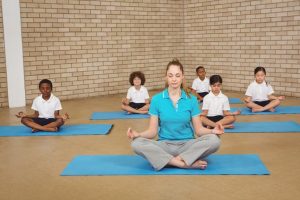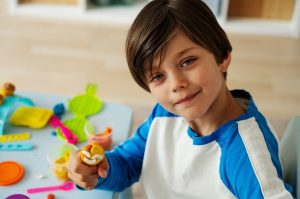Nurture a Happy, Healthy Toddler: Essential Tips to Develop Physical and Motor Skills

Isn’t it delightful to watch a young child discover the world around them? They grab at things that captivate them, crawl or toddle to places that fascinate them, and – more often than not – try to taste things that they really shouldn’t! As entertaining as their antics are to us, it is important to understand that much of a child’s ability, health and wellbeing will depend upon the foundation of physical and motor skills developed at this age.
It is now a well established fact that a child’s future health and ability depends greatly on physical development in early childhood. Parents play a crucial role in nurturing this development in young children and toddlers – particularly physical and motor skills. It is therefore very important for you as parents and caregivers to understand and learn about the various aspects of physical development for young children. This will help you implement activities to promote motor skills development in your toddler, and set them on a path to a healthy and active life.
The Importance of Physical Development in Childhood
Physical development in childhood includes all the changes in a child’s body and their physical ability as they grow. This development is fundamental for their health and wellbeing as it involves building muscle strength, strengthening bone density, improving coordination and body control, and boosting overall physical fitness. Some key areas of physical development in children are:
- Gross Motor Skills: These involve large muscle movements such as crawling, walking, and jumping.
- Fine Motor Skills: These involve smaller movements, particularly those of the hands and fingers, such as grasping and manipulating objects.
- Coordination and Balance: These skills help children perform everyday activities safely and efficiently.
Parents and caregivers must focus on providing young children with opportunities and experiences that encourage the development of motor skills at an early age.
Develop Strong Motor Skills in Your Toddler
Motor skills development is a critical component of physical development as it allows children to explore their environment and interact with the world around them. These skills form the basis of a child’s ability to perform essential tasks as they grow, like participating in sports, engaging in physical activities, and developing independence in taking care of themselves.
Motor skills are generally categorised into two groups – Gross Motor Skills, which involve large muscle groups for whole-body activity, and Fine Motor Skills – which are related to the use of precise muscles for smaller movements.
- Gross Motor Skills Development:
- Outdoor Play: Activities like running, jumping, and climbing help strengthen large muscle groups.
- Structured Sports: Introducing toddlers to simple sports can enhance their coordination and balance.
- Dance and Movement: Dancing to music encourages rhythmic movement and balance.
- Fine Motor Skills Development:
- Arts and Crafts: Activities that promote hand-eye coordination like drawing, colouring, and cutting with safety scissors.
- Building Blocks: Playing with blocks or puzzles that help develop dexterity and problem-solving skills.
- Everyday Tasks: Encouraging toddlers to dress themselves or help with simple household chores to improve their fine motor skills.
Encouraging gross motor skills development in toddlers can be achieved through activities such as:
To help toddlers develop fine motor skills development, you can try activities such as:
Encourage Physical Development Skills at Home
Parents and caregivers play a pivotal role in promoting physical development skills in toddlers. Creating an environment that encourages active play and exploration can significantly enhance a child’s physical development, and nurture the development of motor skills. Here are some ideas to get you started:
- Provide a Safe Play Area: Ensure that your home and garden offer your child safe spaces for active play.
- Engage in Physical Activities Together: Participating in activities with your toddler can motivate them to be more active.
- Limit Screen Time: Encourage more physical play by limiting the time spent on electronic devices.
- Incorporate Physical Activity into Daily Routines: Simple activities like walking to the park or playing a game of catch can make a big difference in building an active lifestyle for your child.
Create a Stimulating Environment for Physical Development
A significant aspect of nurturing motor skills development in a child is creating a stimulating environment that encourages a toddler to engage with the world around them. This is now fairly easy to do, given the wide variety of toys and activities available online and in stores. Make sure you look for things that challenge your child’s abilities and keep them engaged and motivated. Here are some helpful suggestions to get you started:
- Active Play Equipment: These include items like balls, ride-on toys, and trampolines that encourage active play.
- Interactive Toys: Interactive toys require manipulation, such as shape sorters and stacking rings, and actively promote fine motor skills.
- Sensory Play: Involve your child in activities that engage the senses, such as playing with sand or water.
Make the Right Choices for Your Toddler’s Growth and Wellbeing
The joy of watching a child grow and develop into a unique individual is unmatchable – parents and caregivers alike are blessed with the opportunity to witness this transformation. By implementing activities to enhance your toddler’s physical and motor skills development, you can help your child build a strong foundation for a healthy and active life. Another key aspect is to create and seek out environments that nurture healthy all-round development for your child.
At Billabong High International School, we believe in fostering holistic development for children from an early age. Our curriculum is designed to support both physical development and motor skills development, ensuring that your child grows into a well-rounded individual.
Explore our comprehensive early childhood programs and see how we can support your child’s growth journey. Enrol your child at Billabong High International School and give them the best start in life. For more information, visit our website or contact our admissions office today.
This bit seems a bit of a mismatch – although it is connected to overall child development, it feels like it’s a force-fit here. Would recommend deleting this paragraph.








